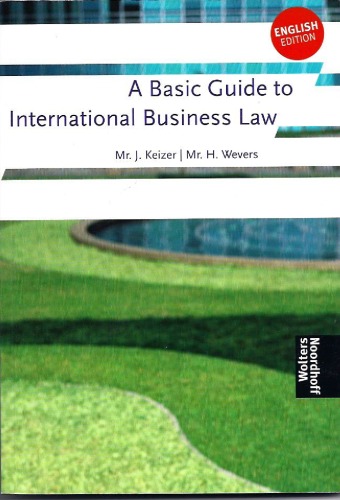

Most ebook files are in PDF format, so you can easily read them using various software such as Foxit Reader or directly on the Google Chrome browser.
Some ebook files are released by publishers in other formats such as .awz, .mobi, .epub, .fb2, etc. You may need to install specific software to read these formats on mobile/PC, such as Calibre.
Please read the tutorial at this link: https://ebookbell.com/faq
We offer FREE conversion to the popular formats you request; however, this may take some time. Therefore, right after payment, please email us, and we will try to provide the service as quickly as possible.
For some exceptional file formats or broken links (if any), please refrain from opening any disputes. Instead, email us first, and we will try to assist within a maximum of 6 hours.
EbookBell Team

0.0
0 reviews
ISBN 10: 1000036190
ISBN 13: 9781000036190
Author: Harm Wevers
A Basic Guide to International Business Law is an introduction to those parts of European and international law that are relevant to business. Having read this book, students will come away with a broad understanding of the international rules of law within the EEC, institutional rules of the European Union, international contract law, rules of competition and the four freedoms within the EEC. The edition includes student friendly features, such as summaries of statements and references to relevant case law, making the book an ideal introduction for those on law and/or business programmes.
1 Introduction to International Private Law and European Law
1.1 Introduction International Private Law
1.2 Introduction to European Law
1.2.1 The Institutions of the EC
1.2.2 Sources of EC law
1.2.3 European Court of Justice and preliminary rulings under Art. 234
1.3 Cases
Glossary Chapter 1
Exercises Chapter 1
2 Negotiations
2.1 Reaching an agreement
2.2 Legal aspects of negotiations
2.3 Breaking off negotiations: breach of contract or tort?
2.3.1 Breach of contract
2.3.2 Tort
2.3.3 Breaking off negotiations: what to claim?
2.4 Cases at the preliminary stage
Glossary Chapter 2
Exercises Chapter 2
3 EEX
3.1 What court of law has jurisdiction?
3.2 EEX Regulation: what countries are involved?
3.3 Provisions on jurisdiction of the EEX
3.3.1 Choice of parties (Art. 23 EEX)
3.3.2 Jurisdiction on litigation over immovable property (Art. 22 EEX)
3.3.3 Jurisdiction in case of litigation over individual employment contracts (Art. 18 – 21 EEX)
3.3.4 Jurisdiction in case of litigation related to consumer contracts (Art. 15 – 17 EEX)
3.3.5 Jurisdiction in case of litigation related to matters of insurance (Art. 8 – 14 EEX)
3.3.6 General provisions on jurisdiction (Art. 2 and 5 EEX)
3.4 Execution of the verdict (Art. 38 EEX)
3.5 Arbitration
Glossary Chapter 3
Exercises Chapter 3
4 ECO
4.1 Introduction ECO
4.2 Conditions on the use of ECO
4.3 Content of ECO
4.3.1 A choice of law made by the contracting parties (Art. 3, 4 ECO)
4.3.2 Law applicable to consumer contracts in Art. 5 ECO
4.3.3 Law applicable to individual employment contracts (Art. 6 ECO)
4.3.4 Law applicable under certain circumstances (Art. 7 ECO)
4.3.5 Formal validity of a contract (Art. 9 ECO)
4.4 Combination of EEX and ECO
4.5 Applicable law on international torts
Glossary Chapter 4
Exercises Chapter 4
5 CISG
5.1 Introduction of the CISG
5.2 Application of the CISG
5.3 Content of the CISG
5.3.1 Formation of the contract of sale according to the CISG
5.3.2 Committing a breach of contract under the CISG
5.4 Answers to CISG Exercises of paragraph 5.3
5.5 Art. 5, 1 EEX, determining place of performance of obligation in question
Glossary Chapter 5
Exercises on EEX + ECO + CISG
6 The free movement of goods
6.1 Introduction of free movement of goods
6.2 Quantitative restrictions
6.3 Measures having an effect equivalent to quantitative restrictions
6.3.1 Distinctly and indistinctly applicable measures having equivalent effect
6.4 Art. 30 EC-Treaty: derogation from the Art. 28 and 29 EC-Treaty
6.5 Case law to justify for restrictions on the free movement of goods
6.6 Cases of the European Court of Justice on Free movement of Goods
Glossary Chapter 6
Exercises Chapter 6
7 Competition law
7.1 Introduction on competition and cartel law
7.2 The cartel law of Art. 81
7.2.1 Effects of the prohibition of Art. 81 paragraph (1)
7.2.2 Exemptions under Art. 81 paragraph (3)
7.3 Abuse of a dominant position under Art. 82
7.3.1 What is a dominant position?
7.3.2 The abuse of a dominant position
7.4 Mergers
7.5 Cases of the European Court of Justice on Cartel law
Glossary Chapter 7
Exercises Chapter 7
8 Carriage, Incoterms & Payments
8.1 Carriage
8.1.1 Parties in a contract of carriage
8.1.2 Carrier and shipper
8.1.3 Carriage and documents
8.1.4 CMR-consignment
8.1.5 Jurisdiction in CMR Convention and under EEX Regulation
8.1.6 CMR Convention and applicable law according to ECO Treaty
8.2 Incoterms
8.2.1 Objects of Incoterms
8.2.2 General set up of Incoterms
8.2.3 Incoterms 2000
8.2.4 Liability of the seller and buyer in case of damage during carriage
8.3 International payments
8.3.1 Payments in open account or clean payments
8.3.2 Cheque
8.3.3 Bills of Exchange (Drafts)
8.3.4 Bank Guarantee
8.3.5 Documentary Collections
8.3.6 Letter of Credit
Glossary Chapter 8
Exercises Chapter 8
Index
a basic guide to international business law 6e druk
a basic guide to international business law 6th edition
what is international business law
basic principles of international law pdf
a basic guide to international business law 6th edition pdf